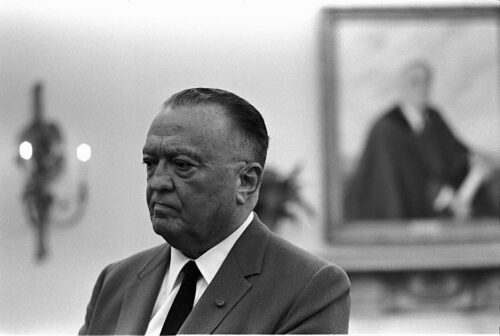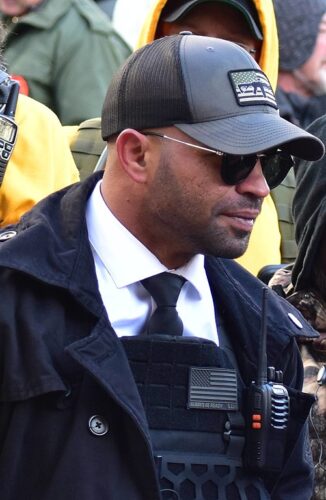Questions should be raised about what role the Proud Boy’s leader may have played in the Capitol uprising, given his past as an FBI confidential source, writes Coleen Rowley.

Proud Boys in a neo-Confederate protest in Pittsboro, North Carolina, 2019. (Anthony Crider/Wikimedia Commons)
By Coleen Rowley
Special to Consortium News
 Enrique Tarrio, leader of the right wing Proud Boys militant group, was a confidential source for law enforcement under Attorney General guidelines that were relaxed after the 9/11 attacks.
Enrique Tarrio, leader of the right wing Proud Boys militant group, was a confidential source for law enforcement under Attorney General guidelines that were relaxed after the 9/11 attacks.
Reuters reported that Tarrio began “repeatedly working undercover for investigators after he was arrested in 2012, according to a former prosecutor and a transcript of a 2014 federal court proceeding.” He helped authorities get convictions in human smuggling, drugs and gambling cases.
At least five Proud Boys members have been arrested and charged for involvement in the Jan. 6 storming of the Capitol, though Tarrio had been nabbed two days earlier and expelled from Washington by D.C. Superior Court.
Attorney General (AG) Guidelines on using confidential human sources — both confidential informants (CIs) and cooperating witnesses (CWs) — resulted from FBI abuses uncovered in 1975 by the Church Committee and were quite strictly followed by the FBI until the Sept. 11 attacks.
The guidelines generally prohibited the FBI from operating people like Tarrio who sought or obtained leadership positions in any domestic group whose violent activities the source was being directed to report on.
This post-Church Committee prohibition made sense not only in light of the committee’s exposure of then FBI Director J. Edgar Hoover’s abusive Cointelpro program of targeting various civil rights groups, but today as well, given how leaders of any group are inherently those with the most influence or power to manipulate a group’s members.
The old AG Guidelines also wisely required some level of actual proof of the group’s violent activities before any use of informant infiltration. A mere FBI claim or an agent’s suspicion was not enough.
Unfortunately, those AG restrictions have been almost fully eroded in the political climate following 9-11, which has seen mass surveillance of innocent Americans and arrests of terrorism suspects on flimsy evidence and limitless internment without due process at Guantanamo Bay.
New domestic fishing expeditions likely beckon after the Jan. 6.
Widespread Informant Use
The number of the estimated 15,000 FBI “informants” and cooperating witnesses being operated at any given time is somewhat misleading because both informant and CW “sources” are and easily opened and closed by completing simple administrative forms.
If the “revolving door” of those being constantly opened, closed and re-opened were to be taken into account, the number of FBI sources (certainly potential ones) would be many times greater.
As FBI file researcher and writer Trevor Aaronson has so accurately described in his books and talks, these FBI sources are all vying to score points to get paid big bucks—often in excess of $100,000/year.
Additionally, the agents operating them are almost always hugely incentivized via big cash “incentive awards” and career promotions to produce prosecutions and convictions, even if they have to sometimes bend the rules, such as when their operatives target mentally and economically vulnerable people.
Most CWs (like Tarrio) are attempting to work off and reduce long criminal sentences they either received or expect to receive.
The upshot is that although agents are supposed to close CIs and CWs who they learn commit new, (unauthorized) crimes, there are big incentives and loopholes running in the opposite direction.
Informant Whitey Bulger and his gang’s murder spree was exceptional only in that it became public knowledge after decades despite strenuous efforts to keep the matter covered up. Such notorious cases are just the tippy tip of the inherent problem in operating informants who are criminals themselves. System secrecy keeps most of the worst abuses from ever being discovered.
It’s kind of funny that Tarrio quickly lied about his CW and criminal background, but it’s also easy to see why he did, given the constant potential for confidential sources to be “re-opened.”
With informers often moving on to new and untapped situations, the knowledge of one’s past work for the FBI or law enforcement would tend to reduce one’s effectiveness at developing trust among a new group being targeted.
So even if Tarrio’s file was technically “closed” at the time of the Capitol uprising, he could realistically expect that it would be re-opened and he would be paid for any juicy info he developed during ongoing or future activities. This is provided that his history of working with the FBI was not known by members of a new group. Tarrio worked as an informant in 2012 and 2014, Reuters reported. The Proud Boys were formed in 2016.
Manipulating Emotion
An informant-CW’s effectiveness tends to depend upon their ability to manipulate others or, if you will, use their interpersonal charisma and appeals to people’s emotional vulnerabilities, such as fear, hate, greed, false pride and blind loyalty.
Most groups caught up in emotion, whether BLM, Maidan Square, Trump supporters, or myriad others, can easily turn violent given the right spark from gifted charismatic and psychopathic leaders. All of the recent mob violence, no matter what cause or agenda from Right to Left, is evidence of how easy it is also for provocateurs to produce this result.
As previously noted, Aaronson and other researchers have exposed the ease of law enforcement’s deployment of manipulative informants in the “war on terror” to falsely claim the FBI is preventing violence. FBI sources have often served to entrap vulnerable people to join staged “Hollywood- type” sting operations.
Government secrecy has still largely concealed what, in my opinion, has long been one of, if not the most significant areas of FBI abuses.
FBI officials have always defended the practice, arguing that there’s no other way to get needed information about criminal activities without dealing “with the devil,” Almost all FBI sources are criminals or fraudsters and almost none are in what is called the “good citizen” category except for the occasional crime victim-type CW.
(It should be noted that there is generally more accountability and oversight with a cooperating witnesses than an informant since a CW’s identity is at least known to prosecutors, and later revealed only when or if the witness testifies at trial.)
The operation of informants, on the other hand, is usually carried out in total secrecy without adequate control or oversight. The Department of Justice Inspector General’s study of compliance with AG Guidelines back in 2005 found 87 percent of FBI informant operations failed (often miserably) to comply with policy. A 2019 IG Audit shows the failures appear to have worsened in the continuing “war on terrorism” and the FBI’s infiltration of Muslim groups.
Considering all these problematic issues of operating confidential sources, Tarrio’s criminal background and work for the FBI should elicit more questions about what role he (and any other as yet unidentified law enforcement sources) may have played in the Jan. 6 storming of the Capitol.
Coleen Rowley, a retired FBI special agent and division legal counsel whose May 2002 memo to then-FBI Director Robert Mueller exposed some of the FBI’s pre-9/11 failures, was named one of TIME magazine’s “Persons of the Year” in 2002. Her 2003 letter to Robert Mueller in opposition to launching the Iraq War is archived in full text on the NYT and her 2013 op-ed entitled “Questions for the FBI Nominee” was published on the day of James Comey’s confirmation hearing. Assigned to the Omaha, Jackson, MI, New York City field offices, and to the U.S. embassy in Paris, and consulate in Montreal, Rowley taught constitutional law to FBI agents in Minneapolis.
The views expressed are solely those of the author and may or may not reflect those of Consortium News.





Funny, too, that few people mention how impeccable the timing of the violence was. I think the lead hooligans and other people in tow entered the buildings about 5 minutes before the “hearings” on election fraud were to occur. I think that certain officials (like Loefler) dropped their support for the hearings soon after. Most everyday people who have to deal with “the system” don’t accept such coincidences, for they are often penalized by “the system” for being in the wrong position of the bell curve. As in, “your house burned down yesterday and you collected a huge insurance award today, yet you moved your computers out of the house right before the fire?” Good luck with that. But time and again in political circles the probability and statistics are pushed to the side. Besides probability, the other missing piece is “motive,” which is a staple of investigative work. Has one reporter, one investigator, yet uncovered any motive for smashing into the buildings? The narrative is that it was a “mob.” Sorry, that doesn’t work in this situation. Mobs act in uncoordinated fashion. There is plenty of evidence to suggest there was coordination, not the least of which was pre-planned attacks or placements of bombs. Are we getting the picture, here?
The FBI. Some friendly advice, never talk to them other than to tell them you want a lawyer. Do otherwise at your own risk. For real.
It seems consistent with the professed ideas of the Proud Boys to want to rat out drug dealers besieging neighborhoods or sex traffickers and other such criminals. The Proud Boys often talk about wanting to clean up those criminal syndicates. So it would not be surprising that Tario and others would contact police of FBI if they had information about drug gangsters.
But I think the real issue here is that Tario is being fitted by the FBI with a “snitch jacket,” as they were called back in the days of COINTELPRO when the FBI was busting civil rights workers, anti-war activists, and others struggling to make society better. The snitch jacket was a way of discrediting a leader and getting this person expelled from the movement. Often the snitch jacket was a false flag operation by the FBI.
As Rowley says above, informants are usually totally secret, but in this case the FBI leaked the story to the media knowing it would be played up into something much bigger than it really was.
If Tario helped ” get convictions in human smuggling, drugs and gambling cases,” then what is wrong with that. Such crimes destroy neighborhoods where working class people live. Police and FBI usually don’t care about this sort of crime. They are more interested in busting blacks or latinos.
I think there’s a lot more of this story that we don’t know.
Thanks for this inside view. We need good information to sort the true conspiracies from the chaff.
FBI=secret police/KGB/Stasi. You’d be a fool to trust these guys.
I will not go into the discussions of what happened before and ON 911 but I support Ms. Crowley’s questioning of the FBI’s handling of the tips they received in reference of Saudis learning to take off and fly but not land commercial jet aircraft and the facts she gives here.
The FBI never answered the questions or provided any explanation that would actually stand up to scrutiny.
It was straight to the patriot act no one in congress read but passed.
The sweet thing about the case of Coleen Crowley is that I have found no where was she described as being a disgruntled employee.
If you use your Merriam Webster’s disgruntled comes from disgruntle. You learn that one becomes disgruntled because disgruntle means “to make ill-humored or discontented. The question is what actions by the “other” created the condition. Even the FBI will tell you one can learn volumes by asking the right questions.
Disgruntlement is something reject-Trump managed to achieve with the proud boys. This word is another that lazy media and dumb politicians and law enforcement entities use to smear individuals by describing the disgruntled behavior as being abnormal neglecting to report that there are always reasons why people become disgruntled. So it turns out becoming disgruntled is a normal human response to negative stimulation. Especially when they are repeatedly exposed.
The FBI failures of 911 should have made agents ill-tempered and not because they were disillusioned but because things didn’t add up but got covered up.
This word has been used to smear legions of individuals often in-appropriately. Say something often enough and repeat it people accept it and this is a great example.
Thanks, much much thanks to Coleen. Now the world can know why and how the FBI has been corrupted by money and why the authorities made certain to scoop Enrique Tarrio up off the street of d.c. so early in the fray.
Thanks to CN PEACE
T-shirt on man in photo above says “Pinochet did Nothing Wrong”.
Tell that to his victims…..
I guess Kissinger’s coup is admired by some people…..
nsarchive2 DOT gwu DOT edu/NSAEBB/NSAEBB437/
There’s a connection between what Ms Rowley shares here and
what that T-shirt reminds us about, IMO.
Based on what I understood from Oliver Stone’s brilliant movie “Nixon”, Kissinger was simply an ordinary self-promoter who saw his chance to curry favor with his boss given Nixon’s damaged self-image and demented cravings.
Kissinger cleverly picked up on Nixon’s psychological demons and ruthlessly exploited them by outshouting the milk toast objections to worrisome foreign policies of saner people in Cabinet meetings to push instead for the foreign policy ruthless aggression that he thought served Nixon’s psyche.
The millions of lives to be lost couldn’t make a dent in Kissinger’s own cravings for power, wealth and recognition.
Ms Rowley’s article reminds us that there are exceedingly few people with the strength of character to do what’s right within flawed institutions.
It seems inevitable based on Rowley’s and other whistleblower reporting that in secretive institutions like the FBI, CIA, Stasi (see the incredible 2006 German film “The Lives of Others”) ordinary people are easily corrupted by a toxic stew of institutional secrecy, hubris, human frailty, structural weaknesses along with the unlimited, undisclosed, taxpayer cash supporting the house of cards.
Hannah Arendt referred to what Ms Rowley has shared with us as “the banality of evil”:
From the website: AEON DOT CO
“Arendt found Eichmann an ordinary, rather bland, bureaucrat, who in her words, was ‘neither perverted nor sadistic’, but ‘terrifyingly normal’. He acted without any motive other than to diligently advance his career in the Nazi bureaucracy. Eichmann was not an amoral monster, she concluded in her study of the case, Eichmann in Jerusalem: A Report on the Banality of Evil (1963). Instead, he performed evil deeds without evil intentions, a fact connected to his ‘thoughtlessness’, a disengagement from the reality of his evil acts. Eichmann ‘never realised what he was doing’ due to an ‘inability… to think from the standpoint of somebody else’. Lacking this particular cognitive ability, he ‘commit[ted] crimes under circumstances that made it well-nigh impossible for him to know or to feel that he [was] doing wrong’.
OK, so this guy was an informant for the FBI? Once an informant always an informant I reckon.
~
Still, make ya wonder about who was pulling his strings.
~
I’d like to know that.
~
Publicly. For all
~
to read.
~
BK
Thank you for this article.. expose!
It’s HUGE
Excellent insight into an area of law enforcement most of us know nothing about. The author raises some very serious questions about the state’s ability to influence the behavior and then impose penalties on any group objecting to the status quo.
S.C.U.M!!! Does this “job” pay well?